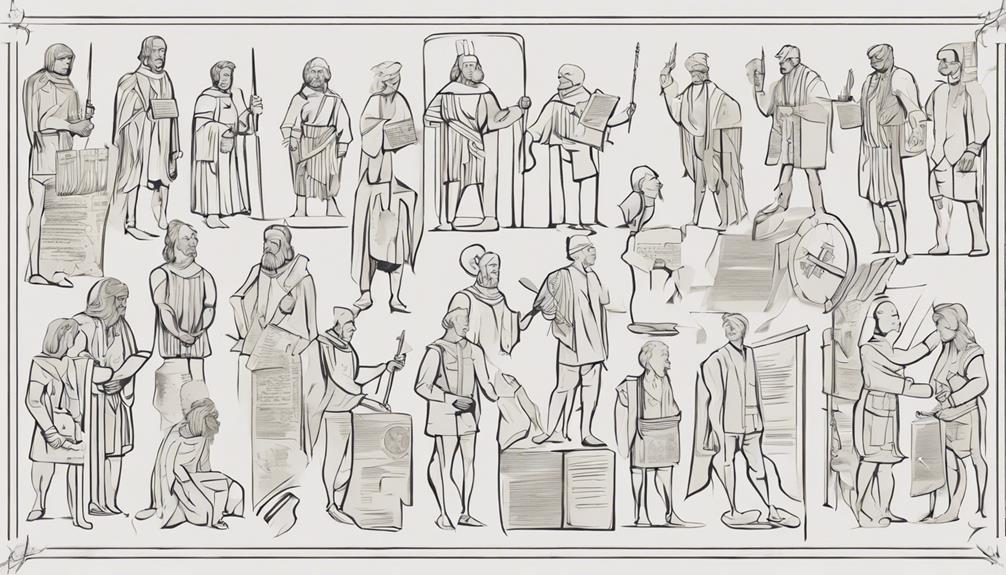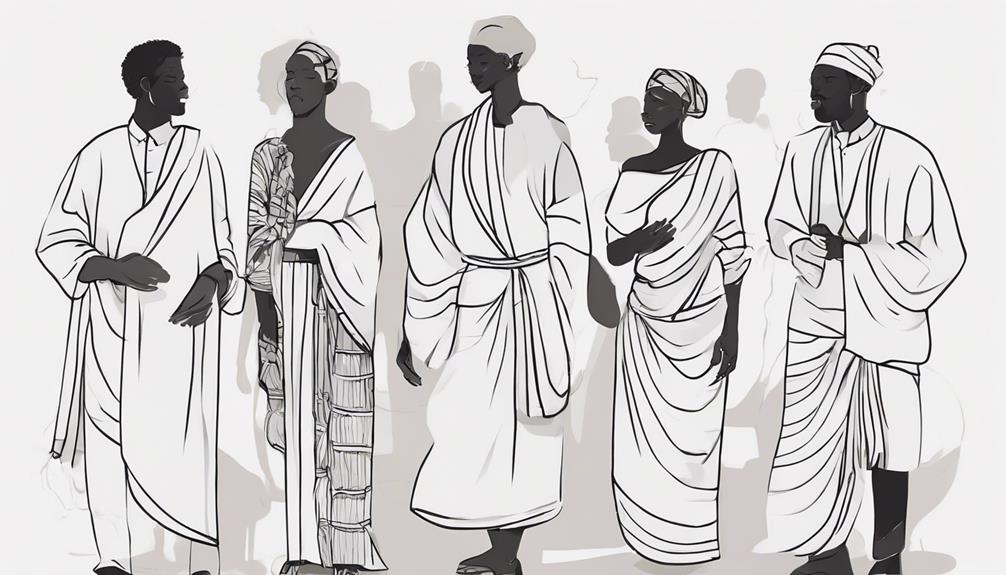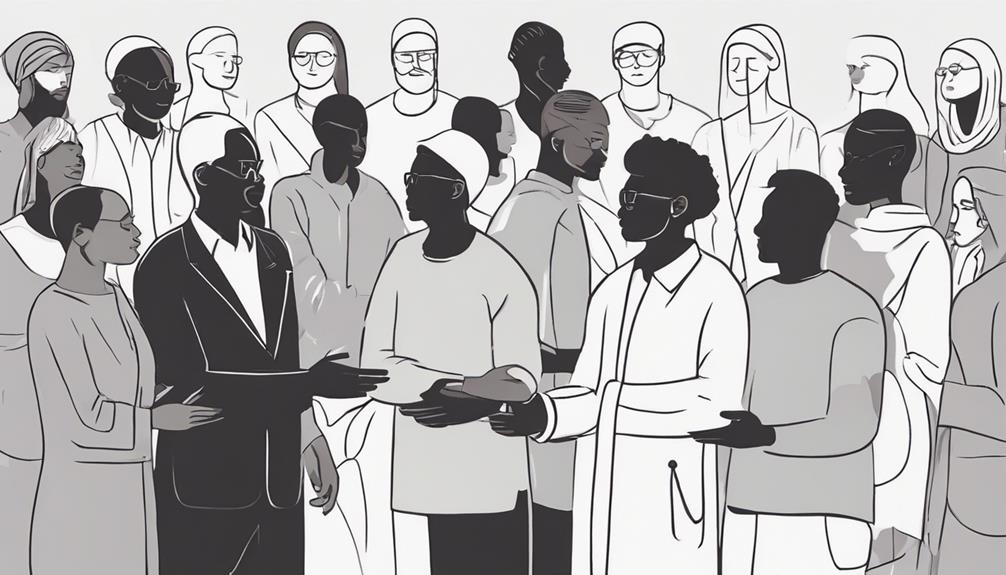When considering the question of whether human rights are universal or culturally relative, it is essential to delve into the complexities surrounding this enduring debate. The clash between the idea of universal human rights and cultural relativism raises crucial questions about the applicability and enforcement of these fundamental rights. While the Universal Declaration of Human Rights lays a foundation for universal standards, the challenges posed by cultural diversity necessitate a nuanced exploration of how to navigate the intersection between universal values and cultural differences. In a world where cultural contexts shape interpretations of rights, striking a balance between universality and cultural relativism is imperative for fostering a more inclusive and just global society.
Key Takeaways
- Human rights are inherently universal, emphasizing equal rights for all individuals.
- Cultural diversity enriches human rights but can challenge universal standards.
- Balancing universal values with cultural diversity is crucial for human rights protection.
- Misusing cultural relativism undermines universal human rights principles.
Historical Development of Human Rights

The historical development of human rights can be traced back to the aftermath of World War II, a pivotal period that catalyzed global efforts to address widespread atrocities and establish a framework for protecting fundamental rights. It was within this context that the Universal Declaration of Human Rights (UDHR) was adopted in 1948 by the United Nations General Assembly. The UDHR, consisting of 30 articles, aimed to set a universal standard for the protection of human rights, encompassing civil, political, economic, social, and cultural rights.
The UDHR represents a significant milestone in the recognition of the inherent dignity and equal rights of all members of the human family. By emphasizing the universality of human rights, the Declaration sought to transcend national boundaries and cultural differences to provide a common moral framework for ensuring the well-being and freedom of every individual. Despite criticisms regarding its imposition of Western values, the UDHR remains a foundational document in the ongoing global discourse on human rights and serves as a beacon for promoting justice and equality worldwide.
The Concept of Universality
The concept of universality in human rights confronts the notion that certain rights are culturally relative. By asserting that fundamental rights are inherent to all individuals, regardless of cultural differences, universality challenges the impact of cultural diversity on global human rights. This discussion initiates a critical examination of how universal principles can navigate the complexities of cultural norms and beliefs to ensure equal dignity and respect for all.
Cultural Diversity Impact
Amidst the intricate interplay of cultural diversity and the concept of universality in human rights discourse lies a fundamental tension that demands critical examination. Cultural diversity, while enriching the understanding and application of human rights standards, can also be misused to undermine universal rights. Attacks on the universality of human rights not only jeopardize the respect for cultural diversity but also pose a global threat to human rights norms. Various forms of relativism further complicate the notion of universality, challenging the consistency and applicability of rights across different cultural contexts. Therefore, it is imperative to strengthen the universality of human rights to ensure that cultural diversity is both respected and promoted within the framework of human rights, fostering a more inclusive and equitable society.
Global Human Rights
In the realm of global human rights discourse, the concept of universality stands as a foundational principle that asserts the applicability of human rights to all individuals, transcending cultural and geographical boundaries. This concept is crucial for fostering a common understanding and commitment to uphold human rights worldwide.
- Universality emphasizes the fundamental equality and dignity of all individuals, promoting a shared understanding of basic rights globally.
- It serves as a cornerstone for international human rights frameworks, ensuring that rights are universally upheld without discrimination.
- Universality challenges cultural relativism by highlighting common values and standards that transcend cultural boundaries, promoting a universal approach to human rights protection.
The principle of universality is essential for the international community to uphold human rights through various human rights instruments, promoting a world where dignity and equality are respected universally.
Cultural Relativism Perspectives

While cultural relativism presents a valuable perspective on the diversity of human rights interpretations across different societies, its application raises important ethical considerations. Cultural relativism argues that human rights are culturally relative, acknowledging that what is considered a right in one culture may not hold the same significance in another. This perspective emphasizes the importance of understanding and respecting diverse cultural norms and values when evaluating human rights, recognizing the pivotal role of culture in shaping perceptions of rights and human dignity.
Critics caution that cultural relativism can potentially be misused to justify human rights violations under the guise of cultural tradition or custom. By challenging the notion of universal human rights standards, cultural relativism highlights the significant influence of cultural context on defining and interpreting rights. Understanding cultural relativism is crucial in navigating discussions surrounding the universality of human rights and in fostering meaningful cross-cultural dialogue to address discrepancies in the implementation and interpretation of rights worldwide.
Challenges to Universal Human Rights
Challenges to universal human rights persist in the face of cultural diversity impact, where differing values and norms can impede the global interpretation and implementation of these rights. Balancing the protection of rights with cultural values remains a contentious issue, often leading to obstacles in achieving universal adherence to human rights principles. Addressing these challenges requires a nuanced approach that respects cultural diversity while upholding the fundamental principles of human rights.
Cultural Diversity Impact
Cultural diversity's impact on the universality of human rights is often manipulated to justify violations and hinder the full realization of fundamental rights and freedoms. This misuse of cultural diversity leads to challenges in upholding universal human rights standards. Some states hide behind cultural relativism to evade their responsibilities in implementing human rights norms. Additionally, reservations based on cultural arguments can impede the complete enjoyment of human rights, especially affecting vulnerable groups like women. This misuse of cultural diversity not only perpetuates human rights violations but also obstructs progress towards achieving equality and dignity for all individuals, irrespective of their cultural backgrounds. Addressing these challenges is essential to safeguarding human rights and ensuring cultural rights are respected globally.
Interpretation and Implementation
The questioning of human rights' universality by some duty-bearers poses significant obstacles to the effective interpretation and implementation of international human rights standards. Challenges to the universal application of human rights hinder progress in addressing issues such as impunity, armed conflict, discrimination, and authoritarian rule. Skepticism surrounding universality also obstructs the ratification of international treaties and the establishment of independent judicial systems, limiting the protection of individuals' rights. Moreover, doubts about universality lead to the invocation of post-conflict trade-offs between justice and peace, which may undermine efforts to uphold human rights universally. Overcoming these challenges is crucial to ensuring the equal implementation of human rights standards for all individuals, emphasizing the importance of a collective commitment to universal human rights implementation.
Balancing Rights and Values
Is there a delicate equilibrium between individual rights and cultural values that challenges the universal application of human rights standards? Balancing rights and values poses significant challenges to the universality of human rights, often leading to debates and obstacles in their implementation. This interplay between individual rights and cultural relativism can create tensions that hinder the universal acceptance of human rights principles.
- Cultural Relativism: Cultural differences and varying values can clash with universal human rights standards.
- Interdependence: The interconnectedness of global societies highlights the need for a common understanding and application of human rights.
- Challenges to Universality: Doubts and skepticism about the universality of human rights can impede their implementation and enforcement on a global scale.
Case Studies on Cultural Differences
Divergent cultural norms and practices present complex challenges in the realm of human rights discourse and implementation. Cultural diversity often clashes with universal human rights standards, as seen in Saudi Arabia's abstention from endorsing the Universal Declaration of Human Rights due to conflicts with Islamic teachings. Authoritarian leaders frequently misuse cultural arguments to justify human rights violations, undermining the universality of these rights. Furthermore, reservations rooted in cultural relativism have impeded the full implementation of women's rights, as evidenced by obstacles faced under the Convention on the Elimination of All Forms of Discrimination against Women.
Moreover, historical instances of forced assimilation have severely impacted indigenous peoples and minorities, stripping them of their cultural rights. Addressing attacks on cultural rights is crucial to ensuring the protection of human rights for all individuals, emphasizing the need to navigate the intricate interplay between cultural diversity and universal human rights principles. By examining these case studies on cultural differences, we can work towards a more inclusive and just human rights framework that respects diverse cultural beliefs and practices.
Balancing Universal Values and Cultural Diversity

Cultural diversity's intersection with universal human rights standards demands a nuanced approach that acknowledges both the richness of various cultural practices and the imperative of upholding fundamental rights for all individuals. When balancing universal values and cultural diversity, it is crucial to consider the following:
- Complementary Nature: Cultural diversity should complement universal values, not contradict them. Respecting diverse cultural practices while upholding fundamental human rights is essential for a harmonious society.
- Misuse Challenges: Some misuse cultural diversity to undermine universal human rights. Addressing these challenges requires a balanced approach that safeguards both cultural diversity and universal rights.
- Global Impact: Attacks on universality can have global repercussions, endangering cultural diversity and impacting the protection of human rights worldwide. Strengthening universal values is vital for promoting global equality and ensuring the realization of human and cultural rights for all individuals. Embracing universality as a global endeavor enhances dignity, equality, and cultural rights, fostering human diversity.
Future of Human Rights Debate
The ongoing discourse surrounding the Future of Human Rights Debate necessitates a strategic alignment of universal principles with evolving societal needs and cultural contexts. As we look towards the future, it is imperative to strengthen the universality of human rights to ensure equality and cultural rights for all individuals. Local initiatives, like those seen in Mauritania, play a crucial role in bridging universal values with local traditions to promote inclusivity within communities. Implementing and revitalizing universality will be paramount for the advancement of human rights in the twenty-first century and beyond. Cultural diversity is a fundamental aspect for exercising cultural rights and fostering human diversity while operating within the framework of universality. Defending and nurturing universality is essential to shield individuals from potential attacks on their rights for not adhering to specific cultural norms.
| Universal Principles | Evolving Societal Needs | Cultural Contexts |
|---|---|---|
| Strengthening equality and rights for all | Adapting to changing demographics | Promoting inclusivity within diverse communities |
Frequently Asked Questions
Are Human Rights Relative or Universal?
Human rights, at their core, represent fundamental rights and freedoms that are inherent to all individuals, irrespective of cultural norms or ethical standards. The universality of human rights is grounded in the belief that certain rights are inalienable and should apply universally. While cultural differences may influence the interpretation and implementation of human rights, the underlying principles remain universal, aiming to protect the dignity and equality of all individuals worldwide.
What Is Cultural Relativism in Human Rights?
Cultural relativism in human rights acknowledges the impact of cultural differences, societal norms, and ethical implications on defining rights and freedoms. This perspective emphasizes that what constitutes human rights can vary across cultures, challenging the notion of a universal standard. By considering a global perspective, cultural relativism highlights the need to navigate complexities in ensuring respect for diverse beliefs and practices. Understanding this concept is crucial for addressing the nuanced debates surrounding the universality versus cultural specificity of human rights.
What Is the Difference Between Human Rights Universalism and Cultural Relativism?
Human rights universalism and cultural relativism diverge in their approaches to ethical implications, historical context, global perspectives, and intersectionality considerations. Universalism advocates for a standardized application of rights across cultures, emphasizing fundamental human rights. In contrast, cultural relativism posits that rights are culturally specific, adapting to diverse norms. Understanding these differences is crucial for navigating the complexities of human rights discourse and ensuring inclusive and effective rights protection worldwide.
Do Human Rights Depend on Culture Why or Why Not?
Human rights are not dependent on culture but are rooted in universal principles that uphold human dignity. While cultural influences may shape how rights are understood and implemented, the ethical considerations and societal norms underpinning human rights transcend cultural boundaries. Embracing global perspectives is crucial to safeguarding these rights for all individuals, irrespective of cultural differences. It is imperative to recognize the universality of human rights to ensure equal protection and respect for all.
Conclusion
In conclusion, the debate on whether human rights are universal or culturally relative is complex and ongoing. While the Universal Declaration of Human Rights asserts the commonality of rights, challenges persist in implementation across diverse cultural contexts. It is essential to balance universal values with cultural diversity to ensure that human rights are upheld for all individuals globally. As the future of the human rights debate unfolds, it is crucial to strengthen universality to protect fundamental rights worldwide. As the saying goes, "unity in diversity."
